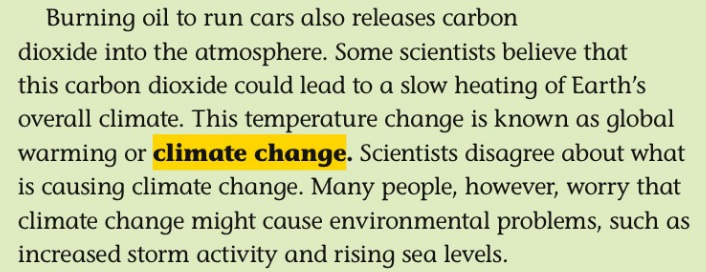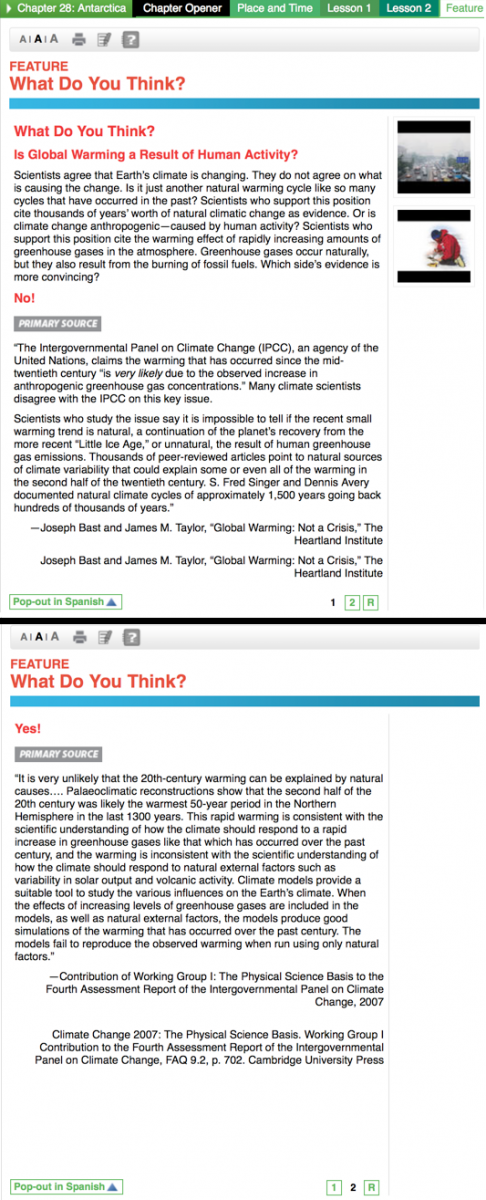“I’d like a Biblical check on that.”
Those were the first words I heard upon logging into Monday’s working session of the Texas board of education. The board was meeting with publishers to discuss revisions to social studies textbooks, in preparation for the final adoption vote on November 21.
I was listening because I wanted to see what, if anything, the publishers would say about factually inaccurate claims in several of their textbooks. My colleague Minda Berbeco found serious errors in several books (PDF), and University of Texas professor Charles Jackson delivered that report to the board at its September meeting. Jackson called on the board and publishers to fix those errors. Tens of thousands of people from Texas and beyond have signed petitions urging publishers to fix the errors (and you can still sign). The board meeting on Monday was a chance to learn what publishers had done to correct the issues raised by the public about all the textbooks (on topics from history to theater to floral design).
Obviously, climate change isn’t the only issue at play before the board. There was much discussion on Monday about whether to refer to the “Torah” or the “Covenant” (which prompted the request for a Biblical check). Was Jewish history given enough room on the page, relative to the coverage of Islam? Should textbooks refer to the “Star of David” or the “Magen David”? Should the fact that Indira Gandhi’s assassins were Sikhs be highlighted or downplayed? Was the work of the Texas navy during the brief existence of the Lone Star Republic adequately represented?
In the end, the publishers were never asked to address their coverage of climate change, but they did get copies of the petition. Some of the smaller publishers have already posted revisions to the online review copies of their textbooks, but we’re still waiting for a response from the biggest publishers.  In Pearson’s myWorld Social Studies Grade 5 textbook, students are told that “[s]cientists disagree about what is causing climate change,” and that “[s]ome scientists believe that this carbon dioxide [from “burning oil to run cars”] could lead to a slow heating of Earth’s overall climate.” Scientists in fact do not disagree about the main cause of climate change. Furthermore, the warming of our climate is already under way, so that passage shouldn’t be in the future tense, and compared to past climate change, this one has already proven to be remarkably quick, not “a slow heating.”
In Pearson’s myWorld Social Studies Grade 5 textbook, students are told that “[s]cientists disagree about what is causing climate change,” and that “[s]ome scientists believe that this carbon dioxide [from “burning oil to run cars”] could lead to a slow heating of Earth’s overall climate.” Scientists in fact do not disagree about the main cause of climate change. Furthermore, the warming of our climate is already under way, so that passage shouldn’t be in the future tense, and compared to past climate change, this one has already proven to be remarkably quick, not “a slow heating.”
Given that Ken Miller and Joe Levine’s Biology is also published by Pearson, and includes a wonderful discussion of the science of climate change, this muddled coverage is deeply disappointing.
 Scarier still is a section of a McGraw-Hill World Cultures & Geography (6th grade) teacher’s edition. This book quotes a passage from the 2007 IPCC report, starting, “It is very unlikely that the 20th-century warming can be explained by natural causes,” but omitting much of the evidence supporting this conclusion, and any discussion of the way IPCC reaches its conclusions or the care it takes to assign meaning to phrases like “very unlikely” to accurately bracket their certainty. Instead, the passage is paired with a deeply inaccurate and misleading excerpt from a pamphlet from the denialist Heartland Institute which alleges that “many scientists disagree” with IPCC’s assessment and that “it is impossible to tell if the recent small [sic] warming trend is natural.” Teachers in this 6th-grade geography class are asked to present both statements to students and ask them “which side’s evidence is more convincing?”
Scarier still is a section of a McGraw-Hill World Cultures & Geography (6th grade) teacher’s edition. This book quotes a passage from the 2007 IPCC report, starting, “It is very unlikely that the 20th-century warming can be explained by natural causes,” but omitting much of the evidence supporting this conclusion, and any discussion of the way IPCC reaches its conclusions or the care it takes to assign meaning to phrases like “very unlikely” to accurately bracket their certainty. Instead, the passage is paired with a deeply inaccurate and misleading excerpt from a pamphlet from the denialist Heartland Institute which alleges that “many scientists disagree” with IPCC’s assessment and that “it is impossible to tell if the recent small [sic] warming trend is natural.” Teachers in this 6th-grade geography class are asked to present both statements to students and ask them “which side’s evidence is more convincing?”
This is flawed pedagogy and factually incorrect. What’s most disappointing is that, if the point is to give students a chance to debate a topic and explore the evidence, there are actually a lot of really interesting geography- or culture-related topics they could explore. As Alice Bell and Leigh Phillips explore at the Road to Paris web site, there are active controversies over how to address climate change, who should bear the costs of averting some climate change or preparing for its consequences, and what the best ways are to prepare. All of those touch centrally on the geography—political, economic, cultural, and physical—and cultures of today’s citizens, and of today’s students who will grow up to be tomorrow’s citizens. There’s no reason for a geography textbook to open up a debate about science to begin with, and especially not one that’s been resolved for over a decade, and most especially not when there are real social studies debates around the same issue to be addressed.
NCSE and the Texas Freedom Network have a petition directed to the publishers, asking them to fix these errors. We delivered thousands of signatures via this petition and related petitions to the board and to publishers’ representatives on Monday, but until they make the changes, we need more signatures and more pressure on the holdout publishers. Sign up now!

